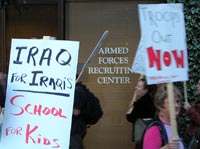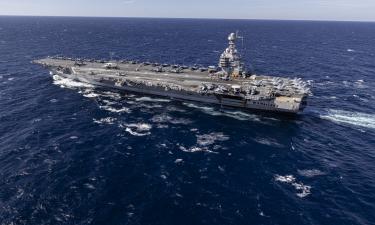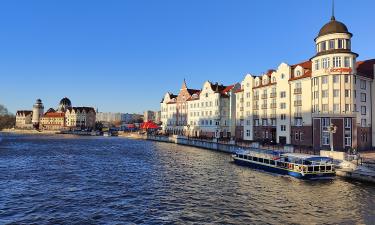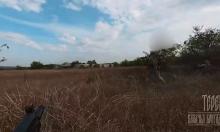Number of victims at recruiting center raises 40 people
New violence flared Monday in northern Iraq with 40 dead in a suicide bombing, while Shiite leaders cut off political talks and denounced the United States over a weekend raid that they said killed worshippers in a mosque. Although the United States said no mosque was attacked, Shiites blamed the military for killing 22 people Sunday. Jawad al-Maliki, a lawmaker from the United Iraqi Alliance, said the Shiite bloc had canceled Monday's session of negotiations to form a new government because of the raid.

"We suspended today's meetings to discuss the formation of the government because of what happened at the al-Moustafa mosque," al-Maliki said, adding that the alliance was expected to decide Tuesday when to resume the talks. President Jalal Talabani said he called U.S. Ambassador Zalmay Khalilzad and they decided to form an Iraqi-U.S. committee to investigate the attack.
"I will personally supervise, and we will learn who was responsible. Those who are behind this attack must be brought to the justice and punished," Talabani said. Monday's bomber struck an army recruiting center, which is in front of a joint U.S.-Iraqi military base between Mosul, Iraq's third-largest city, and the ancient city of Tal Afar.
The attack shortly after noon killed 40 people and wounded 30 others civilians and military personnel who had gathered among a crowd of recruits for the Iraqi army, the Defense Ministry said. The U.S. military said no American troops were hurt in the bombing and reported only 30 dead.
Iraqi army Lt. Akram Eid told The Associated Press that many of the injured were taken to the Sykes U.S. Army base on the outskirts of Tal Afar, about 40 miles west of Mosul, Iraq's third-largest city. U.S. troops helped secure the area after the attack and treat the wounded, the U.S. military said.
In continuing sectarian violence, at least 21 more bodies were found many with nooses around their necks and varied assaults including a rocket attack and bus bombing killed at least 12 people in Baghdad and other towns. Details of a joint U.S.-Iraqi Special Operations attack in northeast Baghdad late Sunday continued to filter out, with Iraqi officials angrily disputing a U.S. account of what happened.
Iraqi Interior Minister Bayan Jabr said the Mustafa mosque was attacked with worshippers killed, while a U.S. statement said the operation focused on "a compound of several buildings and that "no mosques were entered or damaged during this operation."
The military said the joint operation "killed 16 insurgents and wounded three others during a house-to-house search on an objective with multiple structures." They also detained 18 other individuals, discovered a significant weapons cache and secured the release of an Iraqi being held hostage," the statement said. Jabr angrily denounced the operation and rejected the U.S. account.
"Entering the Mustafa Shiite mosque and killing worshippers was unjustified and a horrible violation from my point of view," Jabr said on the Al-Arabiya TV news network. "Innocent people inside the mosque offering prayer at sunset were killed."
Police said gunmen fired on the joint U.S.-Iraqi patrol from a position in the neighborhood but not from the mosque. Police and representatives of radical Shiite cleric Muqtada al-Sadr, who holds great sway among poor Shiites in eastern Baghdad, said all those killed were in the complex for evening prayers and none was a gunmen.
AP reporters who visited the scene Monday morning said the site of the attack was a neighborhood Shiite mosque complex. TV video shot Monday showed crumbling walls and disarray in a compound used as a gathering place for prayer. It was filled with religious posters and strung with banners denouncing the attack.
Other video from Sunday night showed dead male bodies with gunshot wounds on the floor of what was said by the cameraman to be the imam's living quarters, attached to mosque itself. The compound, once used by Saddam Hussein's government, consists of a political party office, the mosque and quarters for the imam.
The video showed 5.56 mm shell casings scattered on the floor. U.S. forces use that caliber ammunition. A grieving man in white Arab robes stepped among the bodies strewn across the blood-smeared floor. Lt. Col. Barry Johnson, a U.S. military spokesman, said the operation was only launched after observation of the site convinced the military it was being used as a kidnapping cell.
"In our observation of the place and the activities that were going on, it's difficult for us to consider this a place of prayer," Johnson said. "It was not identified by us as a mosque, though we certainly recognized it as a community gathering center. I think this is frankly a matter of perception." Hundreds of people turned out for the funerals of those killed in the raid. The mourners, many carrying Iraqi flags, walked alongside coffin-laden trucks, reports the AP.
N.U.
Subscribe to Pravda.Ru Telegram channel, Facebook, RSS!




